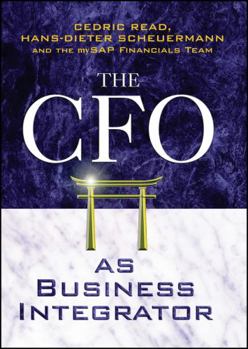CFO as Business Integrator
SAP gehört zu den internationalen Marktführern, wenn es um die Entwicklung von Softwarelösungen für eine unternehmensübergreifende Zusammenarbeit geht.
Moderne Unternehmen machen heute ständig strukturelle Veränderungen durch: rasante Veränderungen in den Geschäftsmodellen, Merger/Akquisitionen, De-Merger
CEOs werden mit einer verwirrenden Vielzahl von Problemen konfrontiert:
- Wie kann man das Unternehmen/die Unternehmenskultur umwandeln, um den Shareholder Value zu steigern?
- Wie können Geschäftsprozesse mit Hilfe des Internet rationalisiert werden?
- Wie kann man Prozesse und Systeme von Vorgängerunternehmen integrieren?
Die Lösung vieler dieser Probleme ist jedoch Aufgabe des CFO.
"The CFO as Business Integrator" befasst sich exakt mit dieser Thematik.
Dieses Buch erläutert ausführlich, warum gerade die Finanzfunktion in einer starken Position ist, um die entscheidende Rolle bei der Integration von Finanzstrategie, Geschäftsprozessen und -systemen zu spielen.
Jedes Kapitel beginnt mit einem Interview eines führenden CFO von so renommierten Unternehmen, wie Exxon, Zurich, Nokia, Bosch, Coca Cola, Siemens und Sony.
Diskutiert werden u.a. Kernfragen zur Integration, neue Integrationsmodelle, Aspekte der Financial Supply Chain und strategisches Management.
Der CFO wird zum Business Integrator, der nicht nur Business Systeme integriert, sondern gleichzeitig damit das Unternehmen der Zukunft formt.
Die einzelnen Themenbereiche werden zwar speziell im Hinblick auf SAP-Technologie und -Lösungen diskutiert, doch im allgemeinen wird der Stoff SAP-neutral, weitgehend unabhängig und objektiv behandelt.
Moderne Unternehmen machen heute ständig strukturelle Veränderungen durch: rasante Veränderungen in den Geschäftsmodellen, Merger/Akquisitionen, De-Merger
CEOs werden mit einer verwirrenden Vielzahl von Problemen konfrontiert:
- Wie kann man das Unternehmen/die Unternehmenskultur umwandeln, um den Shareholder Value zu steigern?
- Wie können Geschäftsprozesse mit Hilfe des Internet rationalisiert werden?
- Wie kann man Prozesse und Systeme von Vorgängerunternehmen integrieren?
Die Lösung vieler dieser Probleme ist jedoch Aufgabe des CFO.
"The CFO as Business Integrator" befasst sich exakt mit dieser Thematik.
Dieses Buch erläutert ausführlich, warum gerade die Finanzfunktion in einer starken Position ist, um die entscheidende Rolle bei der Integration von Finanzstrategie, Geschäftsprozessen und -systemen zu spielen.
Jedes Kapitel beginnt mit einem Interview eines führenden CFO von so renommierten Unternehmen, wie Exxon, Zurich, Nokia, Bosch, Coca Cola, Siemens und Sony.
Diskutiert werden u.a. Kernfragen zur Integration, neue Integrationsmodelle, Aspekte der Financial Supply Chain und strategisches Management.
Der CFO wird zum Business Integrator, der nicht nur Business Systeme integriert, sondern gleichzeitig damit das Unternehmen der Zukunft formt.
Die einzelnen Themenbereiche werden zwar speziell im Hinblick auf SAP-Technologie und -Lösungen diskutiert, doch im allgemeinen wird der Stoff SAP-neutral, weitgehend unabhängig und objektiv behandelt.
Format:Hardcover
Language:English
ISBN:047085149X
ISBN13:9780470851494
Release Date:April 2003
Publisher:Wiley
Length:384 Pages
Weight:1.90 lbs.
Dimensions:1.1" x 6.3" x 9.3"
Customer Reviews
3 ratings
Insightful!
Published by Thriftbooks.com User , 20 years ago
A cynic might be tempted to sneer at a book published by a major Enterprise Resource Planning (ERP) software vendor - specifically, SAP - urging CFOs to make better use of ERP. This software is intended to tie all business functions together in a commonly accessible bundle. Having overspent on this and other information technologies, many executives question its value. Indeed, a recent Harvard Business Review article carried in its title the blunt, provocative suggestion that, "IT Doesn't Matter." Well, these authors believe it matters, because the IT processes and systems that the CFO supports directly affect the bottom line. The book offers valuable case histories, specific technological and managerial counsel, informative charts and candid input from executives. It covers the CFO's perspective on integrating information technology processes into a company's services, supply chains, culture and analytics. Each chapter ends with a useful "CFO Checklist." The cases are promotional and very tech-friendly, so read between the lines. This book is, after all, a marketing initiative. Still, we find the text specific, knowledgeable and worth reading.
Highly Recommended
Published by Thriftbooks.com User , 21 years ago
As the third volume in a series of "CFO" publications," The CFO as Business Integrator" benefits from the author's experience gaining in writing previous books. It is well balanced, and provides an excellent overview of all aspects of business process integration. The book is centrally focused on the new role of the CFO as decision maker and integrator."CFO as Business Integrator" was written by a team of SAP who provide SAP's vision for Finance and Controlling. Topics addressed include: Shared Services, Intangibles, Corporate Governance, Financial Supply Chain, Integration of Planning and Portal access.The book offers a number of case studies, enabling readers to gain insight from real-world examples. Customer studies are offered by Manfred Gentz, CFO DaimlerChrysler, Jim Daley, CFO EDS or Wolfgang Reichenberger, CFO Nestlé.Overall the Book is a good, easy read for CFO's and provides solid information that can be used to implement stronger, more efficient business process across the entire organization, changing the role of the CFO from that of a number cruncher and gatekeeper to a consultant and profit driver.
The best of the "Cedric Read Trilogy"
Published by Thriftbooks.com User , 21 years ago
Following "CFO: Architect" and "eCFO", at last a work of real substance, and minimal PwC consulting-ese (only to be replaced with SAP-centrism, an understandable weakness, as SAP sponsored the book). Each chapter is written by a businessperson with considerable depth in his particular area - from a business perspective - which distinguishes this volume from previous books in the series, which - to put it just slightly unkindly - were written by consultants who couldn't consult their way out of a paper bag.Shortcomings aside, this volume is obligatory reading for every CFO and financial manager who who wants to navigate his company by looking forward versus by looking at the rear-view mirror.






